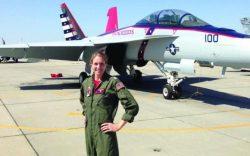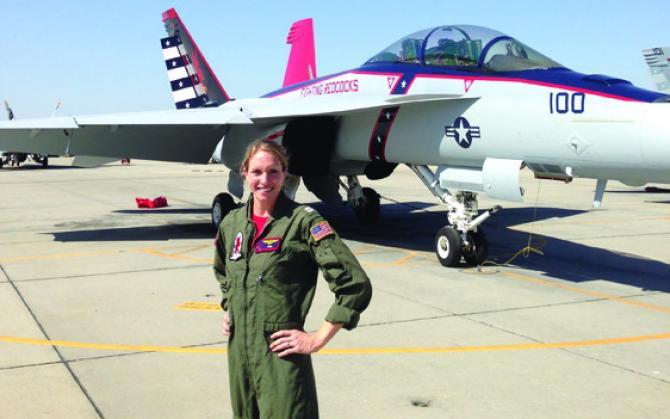
Lt. Jenny Lentz Moore, AE 05, accelerates from 0 to 150 mph in about 2 seconds. And that’s the best part of her job. The worst part? When she has to land the fighter plane back on the carrier. “But only at night,” Moore says. “Landing during the day is very fun.” Moore’s casual tone understates the true challenge and risk of her work. Becoming a fighter pilot marks a major accomplishment in its own right. But as someone who lands F-18s on aircraft carriers at night, Moore grades as one of the elite fighter pilots in the world.
It’s the type of career Moore dreamed of as an undergrad at Georgia Tech, where she majored in aerospace engineering while competing for the school’s swimming and track and field teams. Because of her athletic commitments, Moore couldn’t join the Institute’s ROTC programs. So she began working as a research assistant for the Aerospace Systems Design Laboratory, with the goal of launching a career at NASA after she graduated.
Her research drew the attention of a U.S. Navy recruiter, who offered Moore a job within the Navy’s famed nuclear power program. “To me, it seemed like a great option,” Moore says. “I could see what the military was all about, get my master’s paid for, then try to get into flight school or something.”
Moore accepted the Navy’s offer in the middle of her junior year. After graduating from Tech in 2005 and going through officer training, she moved to Charleston, S.C., to become an instructor at the Navy’s Nuclear Power School, teaching sailors about the operation and maintenance of the nuclear systems powering Naval ships and submarines.
Two years into that position, Moore was brought out to an aircraft carrier to assist in sailor training. While there, she stood on the carrier’s deck watching fighter planes perform carrier training runs. That was when Moore decided to resume pursuit of her childhood dream.
“In my mind, I really thought I was going to apply to flight school and not get in, and I would be at peace with myself,” Moore says. “I made the decision to apply thinking I didn’t really have a great chance of getting in.”
But Moore was accepted. In February 2009, she moved to Pensacola, Fla., to begin her flight training. Moore earned her wings in May 2011, officially becoming a Naval aviator. The next month she moved out to Lemoore, Calif., where she’s currently stationed, to fly the F/A-18 Super Hornet.
The difficulty of Moore’s job isn’t so much the takeoff, which is automated by a steam-powered catapult that shoots the airplane into the air. It’s the landing that really demands expert precision and timing. Pilots landing back on the carrier are aiming for a 2-by-2-foot target, which offers a slim margin for error.
In the dark, poor depth perception and minimal visual references make this a harrowing task, no matter how many times you’ve performed it. In fact, nighttime landings are so difficult that only the United States and France execute them. Among the U.S. Armed Forces, only the Navy lands on carriers in the dark, and only with the F/A-18.
Even though Moore has been a Naval aviator for three years, she’s still waiting for her first combat deployment, which is coming up this summer. After so many years of preparation and training, Moore says she is eager to put her skills to use.
But at the same time, Moore’s life is much different now than when she applied to flight school six years ago. She has since married another F/A-18 pilot. And last summer they welcomed their first child.
There aren’t many mothers working as fighter pilots in the U.S. By the time she starts her combat deployment, Moore says she’ll be the only mom flying fighter planes in a combat zone for the Navy. In fact, she knows of only three or four other moms to have flown F/A-18s over the last 15 years.
Those life changes have stirred up mixed feelings about her impending deployment. Moore says she and her husband are used to spending time apart, but being away from her son for an extended period is difficult to accept. “There are those days where I think I really just want to be a stay-at-home mom,” she says.
Even so, Moore says she feels honored to make the same sacrifices of many service members before her. She views those sacrifices as necessary to preserving freedom and liberty on the mainland.
Moore isn’t sure where her future will take her. She’s less than 10 years from retirement in the Navy and might finish out her career before moving on. But Moore also enjoyed her teaching experience at the Nuclear Power School, and she won’t rule out a return to that line of work.
“I love flying, but also I really love teaching,” Moore says. “Whatever I do next, I’m looking forward to being able to spend more time with my family
